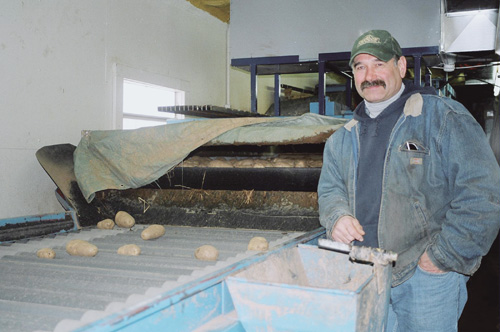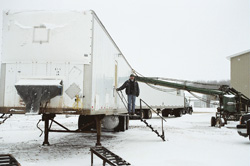
Features
Business
Food Safety
Goal for P.E.I. potato producer is a cleaner spud
March 31, 2008 By Kathy Birt
When major potato processors in
North America see problems with debris in shipments arriving at their
plants, individual growers need to take action.
 |
| Marvyn Webster, of Valley Grove Farms, has just run through the first test for his mobile potato washer. The washer can grade and process from 60,000 to 90,000 pounds per hour. Photo by Kathy Birt |
When major potato processors in North America see problems with debris in shipments arriving at their plants, individual growers need to take action.
And that’s exactly what Marvyn Webster did on his 650-acre potato operation in P.E.I.
Webster, who operates Valley Grove Farms with son Jason and daughter Mary-Jane, says addressing an on-farm need to begin removing items such as golf balls, pieces of wire from old fences, rocks and broken glass from the farm’s potato grading line meant joining forces with Bernard’s Welding, located in nearby Chelton, to build a mobile potato-washing unit.
The mobile potato-washing unit was strategically designed and built to fit inside a 48-foot trailer, while at the same time allowing individuals to work around it, removing, replacing and repairing components as needed.
Bernard’s Welding built all of the wash unit’s components from scratch. And while most are similar to components found in other washing lines, two – the sludge and rock eliminator – stand out for their uniqueness. According to Webster, these two components are additions that wouldn’t normally be seen on a regular grading line. As for the modifications, he says, “We just built it to fit a trailer. The principle of the operation of the unit is not modified.”
 |
| This 48-foot trailer houses a mobile potato washer unit manufactured by Bernard’s Welding in Chelton, P.E.I. Photo by Kathy Birt |
The way the mobile washer works is fairly straightforward. As the potatoes come onto the line, they first go through a flume arrangement that separates out objects that have a larger centre of gravity than a potato. On a stationary washing system, this component can be anywhere from 15 to 20 feet in length. Thanks to the mobile washer’s modified design, the flume has been shortened to four feet, providing a time-savings from the get-go.
During his first run of about 12 million pounds of P.E.I. spuds, Webster found lots of interesting foreign debris.
“What I’ve seen so far coming through is wire from old fences, horse shoes from days gone by, glass that may have come from someone throwing a bottle from a car driving by, and also bones. Anything you can imagine being (buried) in a field, we found it.”
This kind of debris separates quickly in the flume line and is exited out of the trailer into a container located outside. Next, the potatoes go into a drum washer that removes the clay and other unwanted soil debris. The accumulated clay and soil debris moves into a sludge separator that has augers in the bottom to help extract the solids from the water. This debris is also exited from the trailer.
“From there, the potatoes continue through onto a drying table,” explains Webster, adding that this stage of the process helps reduce the risk of freezing in the truck box during transportation. “And then they go over to the grading table, where any potatoes with imperfections are removed.”
This is also the point where any small-sized spuds can also be removed.
Finally, the spuds exit the mobile wash trailer through a hatch into a
waiting truck for transportation to the processor.
With the first experimental run completed, Webster says the mobile washer can put through anywhere from 60,000 to 90,000 pounds of potatoes per hour. He admits there may be other grading lines out there that are mobile, but “they don’t go to the extent of getting rid of debris (the way we do).”
This kind of mobile technology makes sense for Webster, who has a warehouse on Blue Shank Road and another in Port Hill, a distance of 40 kilometres away. “It just doesn’t make economic sense to truck potatoes from one location to another to be washed. It’s just a matter of hitching it to a (truck) and moving it to wherever you need it.”
“It saves moving potatoes back and forth and cuts down on bruising too,” says Tossie Bernard of Bernard’s Welding. “Every time they are put in and out of a truck, they are at risk of bruising.”
As far as mass-producing this mobile washer, Bernard says he will only build another unit if it is ordered. “There is a lot of interest and a lot of farmers want to see it running, but it would tie up a lot of dollars to just build one (without a sale).”
And if there is demand for more mobile washers, future units would likely vary from the one built for Valley Grove Farms. “Another farmer might want to add something, and another might want to take something off. They wouldn’t all be the same as Marvyn’s.”
Webster says he may be open to leasing the unit to other growers, adding he did not build the mobile washer with that in mind. “We are not in the business of custom work. However, looking at how Valley Grove Farms would only use it eight weeks of the year, there is potential for other growers to take advantage of this mobile technology.”
Webster adds that his farm would look at a cost sharing arrangement with other growers who felt they needed this type of unit.
Valley Grove Farms and Bernard’s Welding received funding from the P.E.I. ADAPT Council, the National Research Council and ACOA to help with this project. According to Webster, it cost a couple hundred thousand in time and dollars to bring the mobile washer to fruition. “That would be a ball park figure.”
Currently, Cavendish Farms (P.E.I.) is working with Valley Grove Farm collecting data and monitoring potato loads from the farm that come in for processing. Webster says the operation is delivering 50 per cent of the loads “dry” (not having been through the line).
“We deliver the other 50 per cent of loads that have gone through the line,” he explains. “At some point, we should have some pretty accurate data as to the benefits for both parties – the farmer and the processor.”
And with many processors in other areas of Canada demanding that all produce be washed before being brought to their plants, Webster feels it’s only a matter of time before Island processors will be requesting that all local growers follow the trend.
Print this page